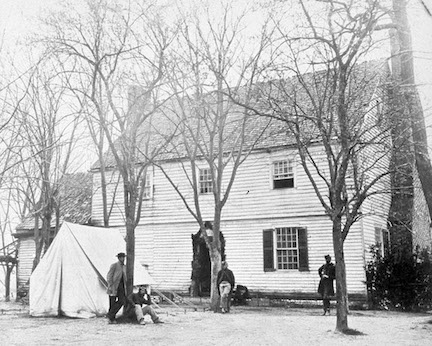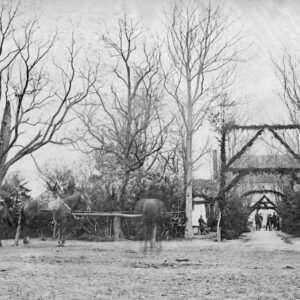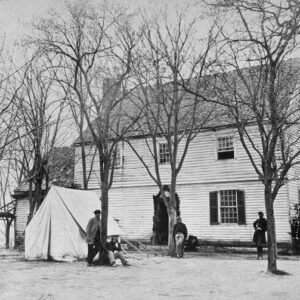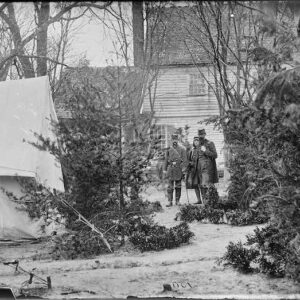Tag: Primmer house Belle Air (Leland Station VA)
 Used as Gen. Whipple’s headquarters, 1863.
Used as Gen. Whipple’s headquarters, 1863.
Leland Station, VA historical marker says: Near this spot stood Belle Air, a prominent Stafford County landmark and home of the Fitzhugh and Primmer families. John Fitzhugh first constructed a house here in the mid-eighteenth century, but by 1854, when the property was sold to Abram Primmer, a new structure occupied the site. Primmer lived here with his wife and six children and owned nearly four hundred acres, which the Leeland Station now encompasses, and was valued at $7,200.
Primmer opposed secession and sent one of his sons to enlist in the Union army. Abram himself aided Confederate deserters and served as a local guide for Union forces. When the Union army occupied Stafford County in the summer of 1862, it used the Primmer fields as pasture for cattle. The largest intrusion upon Belle Air came in the winter of 1862-1863, when the home and farm became a camping ground for the Army of the Potomac’s Third Corps.
The house survived into the mid-twentieth century, at which time the property was known as Walnut Farm. Today, the building no longer stands.
Another nearby historical marker says: Following its defeat at the Battle of Fredericksburg in December 1862, the Union Army of the Potomac went into winter quarters in Stafford County. Here at Bell (sic) -Air (the nearly 400-acre estate of Abraham Primmer, which the Leeland Station community now encompasses), elements of Brigadier General David B. Birney’s division laid out its camps, while their commander established his headquarters at the house. In honor of Major William L. Pitcher of the 4th Maine Infantry, who was killed at Fredericksburg, the encampment was named “Camp Pitcher.”
Soldiers scavenged livestock, fence rails, crops and lumber from local inhabitants. After four months at this location, the area was stripped clean. In March 1863, Union troops left Bell-Air and moved to new camps near Belle Plain along Potomac Creek.
After the war, Primmer received, $2,752.50 from the federal government as compensation for the damage done to his property. His list of damages included four miles of fence and 160 acres of timber consumed as fuel; 20 cords of fruit trees destroyed; hogs, hay and fodder taken; and boards confiscated for use in the construction.
Showing all 3 results


